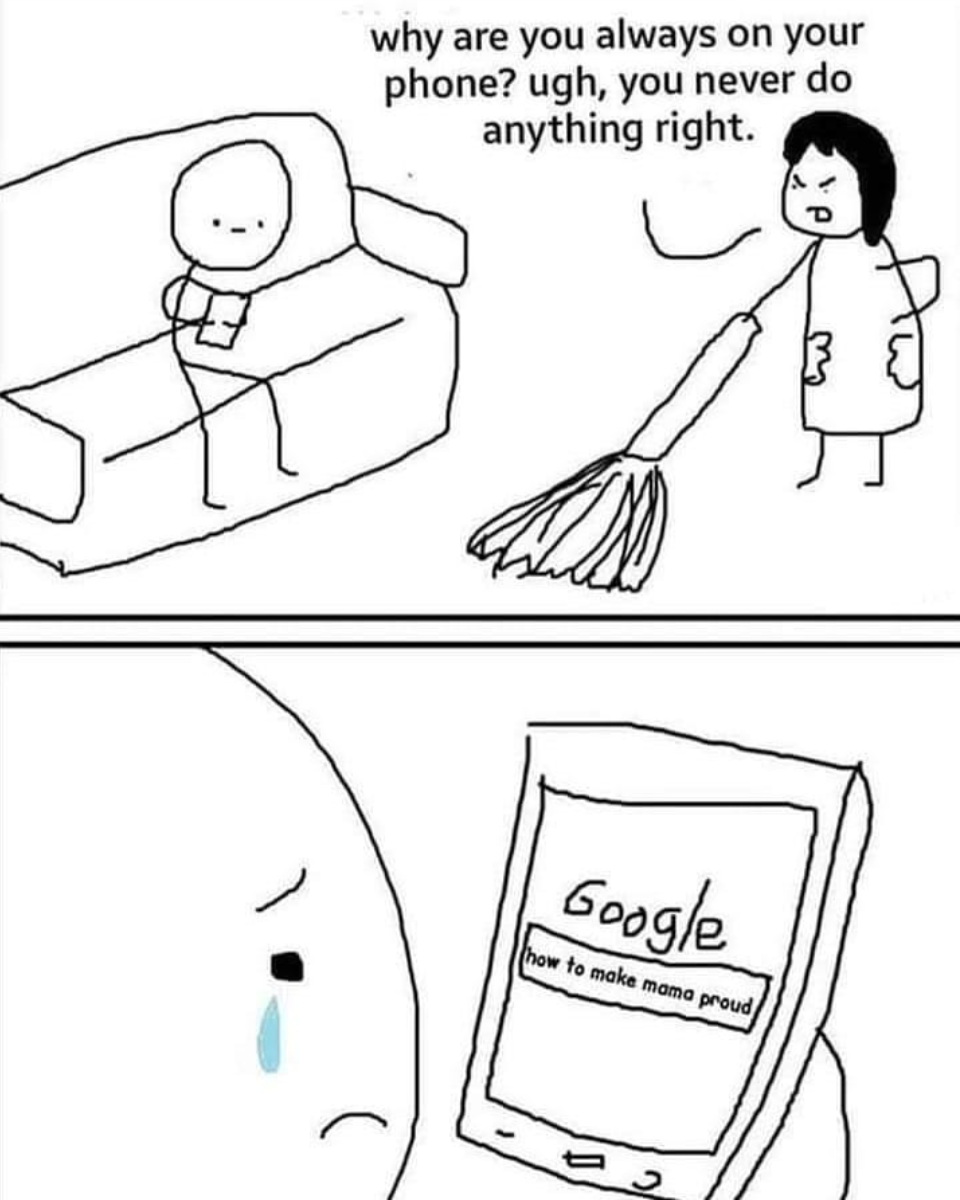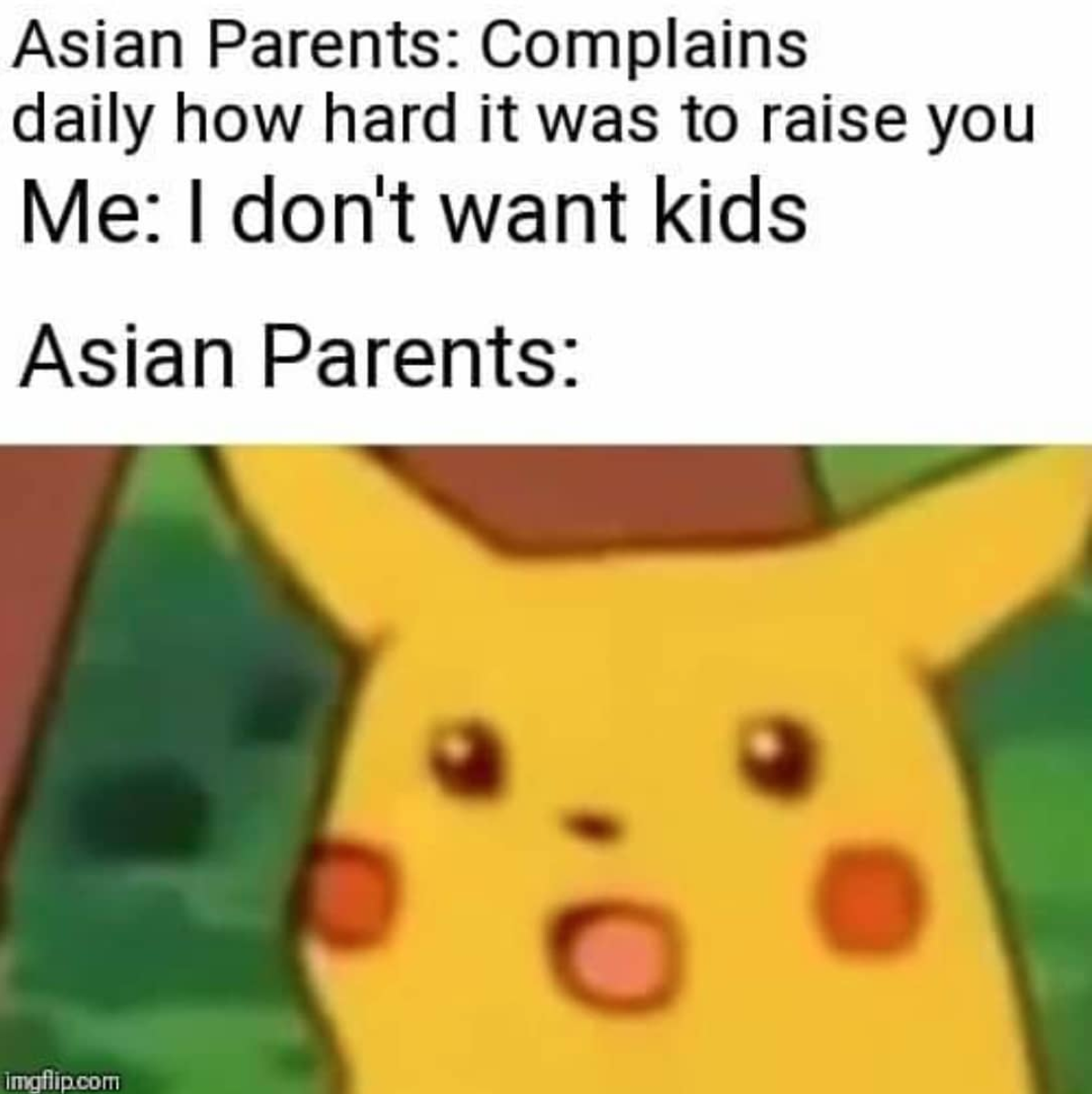How I got my Asian parents to accept my unconventional lifestyle
I recently wrote a post on some of the challenges of vanlife. I don’t want to scare you off, but I didn’t even mention the hardest part, which for me was telling my parents.
When I first worked up courage to tell my mom the plan, she cried. For weeks. In fact, she cycled through all five stages of grief multiple times: denial, anger, depression, bargaining, acceptance.
Tony’s parents are not amused.
Fast forward to 8 months later. My brother texts me, “Mom just used your rock climbing pictures as an analogy for her sales presentation. Apparently half the room flipped out and the rest didn’t know what they were looking at. It’s been two weeks and she’s still proud.” Mom messages me soon after: “The customers are more interested in you than other stuff. My boss wants to buy your van.”
I couldn’t believe it, I was so happy. How did we get to this point?
What is Asian parenting?
Before we begin, I think it’s worth unpacking what Asian parenting even means. There’s been plenty of buzz around Amy Chua’s Battle Hymn of the Tiger Mom, Subtle Asian Traits and Crazy Rich Asians, but to sum it up Asian parents are known for having exceedingly high expectations for their children (understatement of the year). This seems true to some extent of most immigrant parenting across the board, so please excuse my using “Asian” as a liberal catch-all for parents with high expectations. It’s just what I know best.
That moment when Crazy Rich Asians delivered all the feels.
As far as Asian daughters go, I’d give myself a B+. I managed to get into an Ivy League college but it wasn’t Harvard, Yale or Stanford. I spent 10 years studying how to play the piano reasonably well, but I don’t have a PhD (not even a Masters!), nor did I major in STEM. Instead of becoming a doctor or lawyer, I chose the lesser but still acceptable careers of management consulting and finance.
Meet Akrit Jaswal, a surgeon who performed his first operation at age 7. Akrit’s parents are proud of him. Be like Akrit.
That daughter score has dropped precipitously since I decided to quit my job and rock climb full time in a van with my boyfriend, to whom I’m not even married (let alone engaged). Thank you to my soon-to-be doctor younger brother for comforting my parents through this difficult time.
Exhibit A: My childhood in five minutes
If you think I’m joking, think again. Asian parents don’t joke around. They would give everything—and I mean everything—for their children. Every night when I’m home my dad cuts up at least four different kinds of fruit for me to eat. My mom hand-shells fresh pomegranate arils; peels grapefruit from the pith one section at a time; and picks out crab meat from the shell for us.
Despite both being tech execs in Silicon Valley, as soon as my parents got home from work they made dinner from scratch because having home-cooked family meals was important to them. That’s serious love, except Asian parents never say they love you; they show it, mostly with food.
Besides our shared passion for food, my parents’ favorite (perhaps only) hobby was to fast-track us to a better life. Some evenings, my parents would teach me math until it was light out, convinced my inner prodigy could be coaxed out despite my having no discernible aptitude for such.
Unfortunately those Math Olympiad, Mathcounts, and triple accelerated Calculus classes didn’t amount to much.
Tellingly, they sacrificed their hard-earned retirement money to pay my private college tuition in full so I could graduate debt-free. It’s easy to trace back any of my presumed successes in life to lessons they taught me or opportunities they gave me. So when we meme Asian parents, it’s from a place of knowing their parenting is jaw-droppingly selfless.
It’s complicated
All that said, I’ve always had a rather complicated relationship with my parents. It’s probably not just an Asian thing either. As their eldest child and only daughter, I was the guinea pig for some of their greatest and most conservative ideas on parenting (sign her up for every extracurricular activity until she reveals her true genius! No dating until marriage!)
Source: Subtle Asian Traits
They were certainly more reserved with me than with my brothers. As a result the first time I can recall my mom saying she was proud of me was when I was 21. Yep. I pretty much fell apart when I heard it, too. Similarly, it was tough for me to share anything personal with them that wasn’t related to an achievement or a success story. My identity was co-dependent on their approval.
Step 1: You don’t need your parents’ permission
The first baby step in the right direction is accepting that your parents’ feelings toward you are out of your control. Their approval is a shifting goal post, and is theirs to give, not yours to earn. As an adult I thought working at a prestigious investment bank would be enough, but then they started to talk to me about getting a PhD. The treadmill never stops.
When the opportunity to vanlife with my partner presented itself, I both dreaded and looked forward to telling them I was making an original life choice that I was proud of, regardless of what they thought. However, their initial flat-out rejection of my actions was the worst-case scenario I’d imagined. That is to say, I was prepared for, but not quite expecting them to freak out as intensely as they did.
Source: Subtle Asian Traits
Step 2: It’s not about you
With all the time I’ve had to reflect during our travels, it’s obvious to me now that my parents and I were speaking different languages when we had those initial conversations.
The Western culture I grew up in is hyper focused on personal happiness, self-actualization, self-determination. We optimize for happiness and freedom, so of course we want people to live their best lives and make their own choices. Contrast that to many Asian cultures which prioritize self-sacrifice for the greater good, obligations to family and to society.
There’s no way I’ll ever be able to pick crab meat for my kids the way my parents did for me. Their self-sacrifice is next level.
In movies I hear white people say to their kids all the time, “Oh Jake/Connor/Madeline, I just want you to be happy.” That would never happen in our household, ever. When I asked my dad if I could quit swim team because it was making me unhappy, he responded, “The point of life isn’t to be happy.” Wait, it isn’t?
Everything starts to make sense when you realize happiness is not their metric for success in life. Not even close. When I told my mom about my decision to quit my job and rock climb around North America, she told me, sadly, “I’ve failed to teach my kids their responsibility and that there is no such thing as doing whatever they want to do.”
Until then, she had been harboring an unsaid expectation that I would support her so that she could finally retire. When my parents came to the US as first generation immigrants, the first thing they did was to send their graduate student stipends home to China to their impoverished parents.
From my second generation perspective, my parents are successful beyond their wildest dreams and have everything they need, but that doesn’t mean they don’t want to be taken care of. Honestly, they deserve it given everything they’ve done for me.
A cynic might say that parents only want their kids to be rich and successful, but that seems to miss the point. My parents aren’t materialistic. For them, life seems to be about fulfilling a duty to yourself, your parents, society, and frankly anyone who has ever invested in you, by living up to your potential. On the other hand, it’s fair to point out their notions of how to achieve one’s potential are extremely limited in scope. That’s hopefully where you come in.
Step 3: Speaking your parents’ language
If you want your parents to understand your perspective, you need to speak their language. It doesn’t exactly resonate with Asian parents when you talk about happy your choices make you, how free you feel, how personally fulfilled you’ll be. Quite the opposite: they like hearing about the value of hard work, setting goals and achieving them, making things that are valuable to other people, and setting an end date for your exploration.
Above all, they want you to be safe. Parents are inherently risk-averse. They value your security and long-term comfort over the potential rewards that come from risk-seeking. If that’s the case, let them know why your odds of surviving your adventure intact are excellent. For instance, in the midst of this coronavirus hysteria my mom is praising the Lord that I’m isolated from civilization.
After I became aware of these things, I started having better conversations with my parents. The final piece of the puzzle was training myself to hear what they were really trying to say.
Mom: “When you are back I would like to have all copies of your photos in hard disk.”
Translation: I’m so proud of you I want to show you off to anyone who’ll pay attention.
Mom: “Your cousin/friend/doctor’s wife’s friend’s son-in-law just proposed to their girlfriend.”
Translation: You’re priceless. Don’t settle for anyone who treats you any less.
You’re probably already doing things your parents are extremely proud of, yet they might not show it in ways you recognize. You just have to learn the signs.
Step 4: Acceptance
When I completed my hardest climbing route 8 months into vanlifing, I briefly texted my parents I had accomplished my goal for the trip and was ready to settle down again. I was not prepared for this reaction.
Dad breaking the Internet
On his WeChat feed, my dad had posted a screengrab of my Instagram photo and overlaid it with a quote from my post. “It’s her!” he wrote. “Thank God she’s finally coming back safely.”
It’s possible they were simply relieved I was finally ending this madness. It’s possible I’m no closer to getting them to accept my unconventional lifestyle than when I started. That said, I’m choosing to see it in a positive light. I truly believe my reflection on working hard and not being afraid to fail resonated with both of them.
But it was ultimately my brother who explained to my mom what it all meant. Apparently he told her that rock climbing at this level is pretty much professional, and it means that whatever crazy thing Connie decides to do next, she can do it better than anyone else. To my mom, it meant the world, and not for the achievement-driven reason you might expect. “Do you know how lucky you are,” she said, “to have a brother who respects you that much?” Oh yes, more than you know.
All along, what our parents want is for their kids to live for something greater than ourselves. That we stay humble, that we know where we come from, and we respect and remember our family.
So if nothing else, take this as a blessing to go out and get after it, whether it’s art school, a non-profit in West Africa, running for president (Andrew Yang 2024), or becoming a pro gamer. This goes for anyone, not just those with Asian parents.
That is, anyone except my brothers. Guys, if you’re reading this, please stay in school and find good jobs. We need at least one doctor or lawyer in the family.












